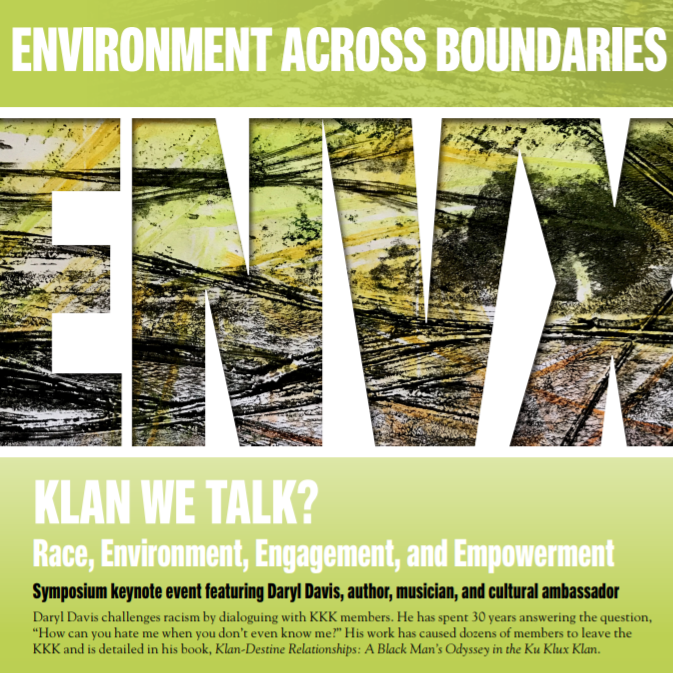This week we had the privilege of hearing from and speaking with Daryl Davis, an accomplished black musician who has a rather unique hobby of making friends with KKK members. He has succeeded in getting a great number of them to leave the Klan.
The ENVS department had invied Daryl to speak with us because of the emphasis in our program about engaging across boundaries. Since the beginning when we explored our Ecotypes, I’ve been realizing how powerful it is to be able to get to a deeper level of understanding regarding difference. The Ecotypes survey allows you to compare where you agree and were you disagree with another person, and there nearly always will be some overlap. The points of agreement allow you to connect and begin to empathize, but it is the points of difference that are the interesting and more important ones because they serve as a catalyst for a conversation in which both parties learn something.
This was prominent in Daryl’s incredible and rather amusing stories of his conversations with Klansmen. There is an NPR story about how he got into this and his TED talk with more details. His ability to connect with these men who seem to be complete opposites and who openly hate him rests in respect. Daryl taught them to respect him by listening intently to everything they said and doing his research to show that he cared about what they had to say. After being so well listened to, the Klansmen extended the same gesture of respect back to Daryl.
“You can hate me, but you can’t hurt me”
Daryl Davis
This world is more and more divided every day and messages of hate are being sent in every which way from every side. It is so hard to take. Every one of us feels unheard. It is easy to feel like “nobody will ever get it” and “why are they being so unreasonable” and “I just hate those haters.” But as it turns out, everyone’s experience of the world is equally valid. Every single person is unique in their beliefs because of hundreds of forces including culture, psychological encoding, and even the random lottery of birth. As hard as it is to admit, were you put in the same position, you might end up with the same beliefs as your worst enemy.
The key is understanding. Daryl reminds us that KKK members cannot hate him since they’ve never met him. Whenever he is confronted with someone saying something that he might take personally, he reminds himself he is there to learn about this other perspective. When he doesn’t understand why someone believes something, he says “tell me more.” When we get angry, we get defensive, and we don’t listen. But when we ask questions, we begin to understand and can empathize.
This is the difference between love and hate. But they are shockingly similar in how they satisfy people. An article entitled Addicted to Hate, by Wes Enzinna, likens hate to an addiction. Enzinna explains how, like many addictions, hate stems from a “craving for group identity, adrenaline, and the psychological kick.” Many of the members of hate groups who the author discusses quit their groups, but soon find themselves relapsing or getting addicted to drugs or other destructive behaviors. Suddenly, all they’ve ever known, their friends, their social support system, their sense of identity, has been left behind and they find themselves alone.
“We can’t vilify racists, but we can vilify racism”
Pardeep Kaleka, whose father was killed by a Neo-Nazi
Humans are social beings. So much of our psychological well-being depends on having a sense of belonging, this is why many people join clubs, go to church, and maintain friendships. Unfortunately, hate groups also provide that for people.
The problem is that hate spreads faster than love. A number of studies have shown that it takes six positive things to outweigh a single negative one. We see this being applied from relationships to business. This means that there has to be six times more love than hate in the world in order to yield positive growth.
We are so affected by our environment. And in ways we aren’t even aware of. If we live in an environment of hate and negativity, we feel depressed, upset, and alone. But if we cultivate positivity, imagine the power. Try this: walk around smiling at everyone you pass. Unless your radiant joy freaks people out like mine sometimes does, you might get a lot of smiles back! That is spreading the positivity! When we feel supported, we are kinder, we feel safer, and we want to support others too.
What if we all felt excited about getting to fight for the environment and engage in discussions as complicated and important as race. What if every time was said, “woah this is hard,” we also said “yes, and… its making me grow, its exciting, I do it because I want to, we will succeed, and look at us fighting for the world we want!? Maybe we’d realize that we can respect one another despite our disagreements, even because of them, because it is our disagreements that awaken us to the good fight, and keep us invigorated with participating in the challenges of our time.

